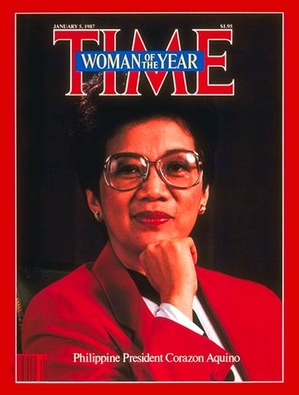
Corazon Aquino’s ascent to the presidency of the Philippines reads like something out of Shakespeare where heroines “have greatness thrust upon ’em.” The convent educated mother of five and wife of Benigno Aquino, the brilliant Philippine senator and leader of the opposition Liberal Party, went from a minor character in the drama to the leading lady in the tragic flash of a bullet. After an extended stint in jail at the hands of military strongman Ferdinand Marcos and years of exile in the States, Benigno Aquino was murdered as he got off the jet for his homecoming in Manila. The rhythm of Cory Aquino’s quiet domestic life suddenly shifted like the plot of Hamlet or Macbeth.
Placing herself in harm’s way, she returned to the Philippines to bury her husband and join the two million people who came out to grieve his passing with her. They too had lost husbands and sons at the hands of the junta. As the playwright knows, the only thing more potent than a hero is one that is lost for the noble cause. Chaos ensued and Marcos unexpectedly called for a snap election in which business leaders and members of the clergy nominated Cory Aquino to unify and head the opposition ticket. She was reluctant to accept it because it could easily expose her children to danger. So, she spent a day in a cloister and meditated on her situation before agreeing to run for office.
Voters were intimidated by the regime and the balloting was rigged so that Marcos was declared the winner. Riots and violence followed as the disenfranchised citizens of the country erupted. Marcos and US diplomats tried to broker a power-sharing arrangement with Aquino but she refused. Less than a year later, under increasing pressure from both domestic and foreign powers, Marcos fled the country and Aquino was seated as the first woman President of the Philippines and the first female head of state in all of Asia.
The unassuming housewife became a symbol for human rights and reform. She was Time Magazine’s Person of the Year, a finalist for the Nobel Peace Prize and spoke to a jubilant United States Congress. But there was work to be done and mistakes were made. Aquino appointed a blue ribbon commission to author a new “Freedom Constitution”. She disbanded the Supreme Court and reseated a new group of Justices charged with cleaning up corruption and advancing legal reforms. She even reorganized the Office of the President to assure that its powers were limited by the Philippine Congress. President Aquino tried to overturn decades of intimidation and profiteering throughout the entire archipelago in the span of a year, but it was too much, too fast.
There were coup d’états that needed to be quelled. International debts that were poorly restructured put the country in a state of hyper-inflation. The Philippine Senate failed to ratify a long standing treaty with the US which abruptly closed the Naval Base at Subic Bay, the largest employer in the region. Even nature was uncooperative as volcanic eruptions that killed thousands and left an entire nation under several inches of toxic ash.
Fortune waits for no one. Opportunities make their entrances and exits on tiptoe. There is little sound or fury. What makes the story of Corazon Aquino so remarkable is her transition from character to narrator – from Juliet to the Bard himself. Most never get beyond memorizing their own lines. She was indeed the right person at the right time. Then the time changed and what worked in the beginning worked against her in the end. But she knew that and she exited on cue as aptly as she had entered. A most excellent player advances the plot by making the most of their time on stage.
Jeff DeGraff
Connect with me on Twitter
Join me on Facebook
Visit InnovationYou.com


Jeff DeGraff is the Dean of Innovation – an author, speaker, and advisor to Fortune 500 companies and mission-driven organizations worldwide. He’s the CEO and Founder of Innovatrium, Founder of Intellectual Edge Alliance, and Clinical Professor of Management and Organizations at the Ross School of Business at the University of Michigan. Jeff co-created the Competing Values Framework and developed the Innovation Code and Innovation Genome methodologies which provide organizations with practical tools to reconcile competing priorities and drive breakthrough performance. His mission is the democratization of innovation: making systematic innovation accessible to everyone, everywhere, every day.
